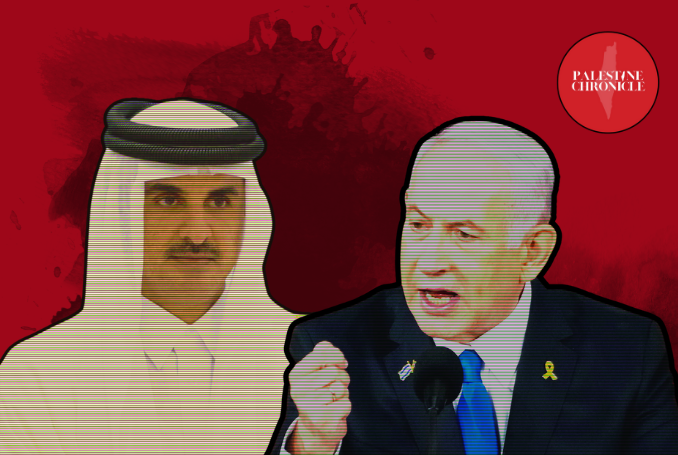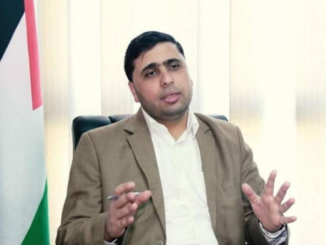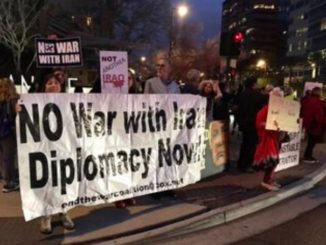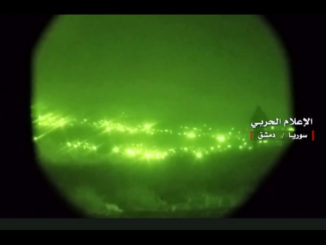
Qatargate is important in that it reveals how close the relationship between Doha and Tel Aviv truly is, but it does not provide any kind of revelation that Netanyahu had a secret pact to finance Hamas.
Israel’s newest scandal involving its Prime Minister Benjamin Netanyahu’s alleged dealings with Qatar has sparked enormous backlash, yet is largely being misinterpreted by Western corporate media.
Dubbed “Qatargate”, the Israeli prime minister’s aides stand accused of either directly or indirectly working for Doha.
The Qatargate story was originally exposed by Israeli journalist Bar Peleg for Haaretz News in November. What were presented as revelatory scoops concerned two Netanyahu aides, Yonatan Urich and Srulik Einhorn, who were accused by Haaretz of using their company, Perception, to “whitewash” the image of Qatar.
The information revealed came from 2022 documents, and according to the Israeli media outlet, a media influence campaign was launched to change the perception of Doha prior to the FIFA World Cup.
Yet the story didn’t end with Urich and Einhorn. Netanyahu’s spokesperson for military affairs, Eli Feldstein, along with Urich, were arrested as part of an investigation into what has been presented as a direct collaboration between the Prime Minister’s office and Qatar.
Netanyahu has not been silent in all of this and portrays the entire situation as a “witch hunt” that has led to his aides being “held hostage”, framing the entire situation as a Shin Bet (Israeli domestic intel/security agency) plot against him.
Understanding the Scandal
In order to make sense of this story from the outside, it has to be analysed through a critical look into Israeli domestic political affairs and its current climate. While the facts published by Haaretz and other Israeli media outlets are solid, some of their interpretations are where things begin to fall to biases.
To begin with, this story is not actually new, and Haaretz has been exposing it for some time.
There has also been no determination on the severity of the case that is being investigated by the Israeli authorities, while technically it is also not illegal for someone to work on a pro-Qatar PR campaign.
But the issue does not even start with the Israeli media’s reporting, instead, it is linked to two primary issues that date back years. Understanding these two issues will help inform any outside analyses, pushing past the biases and anti-Palestinian prejudice that exists within the Israeli press.
These are the transfers of Qatari aid money to Hamas and the Israeli PM’s attempt to form what can be called a quasi-dictatorship.
The Qatar-Israel Relationship
The relationship between Tel Aviv and Doha, although not ratified by any formal normalisation agreement, has been rather overt for decades now.
Despite the relationship being nuanced, as Qatar has historically funded Hamas and provided refuge for the movement’s leadership, there can be no doubt that the ties between both Israel and Qatar are nothing new.
In fact, Israeli officials and civilians have long travelled freely to Doha, even at times when their neighbours forbade it on an official level (privately, there were visits).
For the Israeli domestic audience, the main problem they have with Qatar is its support for Hamas and Al-Jazeera, which has worked in many ways to undermine Israel in the media sphere. This perception of Qatar as being a “financier of terrorism” is, therefore, a useful political weapon for any Israeli official to use against the other.
In 2017, a major shift in regional dynamics occurred. Qatar was placed under siege by its neighbors, Saudi Arabia and the United Arab Emirates (UAE), who demanded the end of their support for Hamas, Muslim Brotherhood-aligned groups at large, and the disbandment of Al-Jazeera.
The Palestinian Authority (PA) also decided to cut off and/or greatly reduce the salaries it had historically granted to its former officials and members in the Gaza Strip.
The PA decision came amidst Israeli pressure that prevented tax revenue from reaching them, in addition to other pressures exerted by the US as well, on top of their own largely self-inflicted internal issues that affected the West Bank economy. This also just so happened to come soon after an agreement was struck between the PA and Hamas, which was designed for the PA to take over the Gaza Strip’s civil administration.
The Hamas-PA reconciliation agreement almost succeeded, with PA forces even deploying to the Rafah Crossing and causing broad celebrations across Gaza, by people hoping to see the easing of the siege. The Israelis and Americans decided to apply pressure, leading to the initiative’s collapse.
The following year, on March 30, 2018, the people of Gaza from across the political spectrum launched a non-violent mass protest movement calling for the end of the Israeli blockade.
While the PA’s former employees suddenly lost their livelihoods, the protests were a tactic that Hamas decided to endorse as a means of attempting to ease the blockade on Gaza. Ultimately, Hamas did not fire on Israelis during the initial period of the protests, despite constant Israeli airstrikes and the slaughter of hundreds of unarmed demonstrators.
Tens of thousands of unarmed demonstrators were deliberately targeted and injured by Israeli fire, on top of the hundreds who were executed, yet Western media ignored the issue or attempted to justify it. Western nations claimed Israel was “defending its border” from non-existent threats, while the PA remained silent.
A Deal with Qatar
As tensions began to boil and Hamas realized that they had exhausted all diplomatic and non-violent options, the Israeli government decided to strike a deal with Qatar that allowed for the transfer of cash payments into Gaza that were used to subsidise fuel and pay salaries. The transfers came in the controversial manner of suitcases filled with cash, delivered by Qatari officials through Israeli-held territory.
Netanyahu and his government had granted approval for the transfers in order to try and stop Hamas from applying military pressure on Israel, overting the fire of rockets, for instance. At the beginning, this tactic worked, despite repeated flare-ups, initiated by Israel each time. That was until 2021, when Israel’s aggression in Jerusalem caused an uprising, which was followed by a response from Hamas that led to an 11-day conflict.
Later that year, Netanyahu was ousted from government, as his allies and Israeli extremists continued to encroach on the sovereignty of Al-Aqsa while escalating their ethnic cleansing program against native Jerusalemite Palestinians. During this period, leading up to the fall of the Netanyahu government, criticism began surfacing for the Qatari transfers to Hamas in the Israeli press.
When Yair Lapid and Naftali Bennett formed a power-sharing government between 2021-2022, both taking power for a period of time each, the Qatari funds were still being processed, yet the suitcase method was changed due to the criticism that arose.
This point is key, as all the Israeli opposition figures claiming that Netanyahu was responsible alone for transferring cash to Hamas were almost all also implicated.
Then, following October 7, 2023, the Israeli media that opposes Netanyahu and his coalition allies began spreading claims that the Prime Minister was “funding Hamas” and had “propped them up”. While some of these reports do reveal important information, as do some of the Israeli internal investigations into October 7, they are also published with political and strategic purposes.
Prior to the beginning of the genocide in Gaza, there was a major political crisis that broke out between the ruling coalition and the opposition over Benjamin Netanyahu’s judicial overhaul push.
The effort was seen by roughly half of the Israeli population as a positive initiative that had been long overdue, while the other half of the country viewed it as an attempt to not only topple Israel’s liberal-democracy model, but also an attempt to Judaize their secular nation.
Therefore, the Netanyahu government ended up becoming perhaps the most divisive in Israel’s history. It triggered the Histadrut (Israeli Labour Union), much of Israel’s media establishment, intelligence services, courts, military, and a large segment of the political elite to take direct measures to force an end to the policies being imposed.
Hundreds of thousands of Israelis protested week-in-week-out against the ruling coalition. All of this context is really important to understanding Qatargate and the different propaganda lines adopted when it comes to the issue.
Implications of The Scandal
The Israeli journalist who is credited with breaking the Qatargate story, Bar Peleg, appeared recently on the Haaretz Podcast.
While wrapping up the segment covering the story, Peleg made a rather telling admission, stating that the actions he had uncovered are not necessarily illegal under Israeli law and acknowledged that influence campaigns funded by Doha had been uncovered in Europe, too.
He stated the central issue of concern to the scandal was the fact that Qatari aid money had gone to fund the armed wing of Hamas, the Qassam Brigades, which helped enable the October 7 attack.
Peleg states the claim that the Qatari aid had funded Al-Qassam as if it were an established fact. This claim primarily hinges on an Israeli Shin Bet investigation into the events of October 7, which concluded that 4 million out of the 30 million dollar transfers were being siphoned off in order to finance al-Qassam.
However, there has never been any hard evidence to support this claim, only Israeli internal assessments.
In late March, two reports – one for Israel’s Channel 12 and the other by its public broadcaster Kan – stated that both the head of the Israeli Military Directorate and Shin Bet had warned Netanyahu in 2019 that Hamas could have been funnelling millions of the Qatari aid to Mohammed al-Deif (Commander of al-Qassam).
While Netanyahu denied that any documents were ever given to him, which is expected, there are still some holes in the logic here and a complete lack of proof.
Israel evidently had little knowledge of the inner workings of the Hamas military wing, this much is evident from their countless failures during the Gaza assault.
Also, it is a stretch of the imagination to believe that they had somehow received any concrete evidence that Mohammed al-Deif was specifically receiving the funds, as the amount of intel on him was extremely scarce and Israel’s various attempts to assassinate him throughout the war were announced, before being retracted, with the confirmation that he had been killed not emerging until after the January 19 ceasefire went into effect.
Netanyahu’s narrative here is that the 4 million that Hamas was sending to Qassam, as per the Israeli intelligence estimates, was not coming from the Qatari aid grants. It suffices to say that this point, played on through the Israeli media, is not a proven fact. It may end up turning out to be true, but there is simply no proof.
The strongest evidence is the Shin Bet report, which also says that Iranian funding and that Netanyahu’s allies making provocations in occupied Jerusalem were contributing factors. It is not as if the Shin Bet report was solely blaming or focusing in depth on the 4 million allegedly sent to al-Qassam. In addition to this, all documented accounts appeared to show that the money had been spent on things like fuel and salaries.
What has to be understood here is that, despite the veracity of the claims about what happened to the Qatari aid money, the issue is being used as a political tool by Benjamin Netanyahu’s opposition. An opposition that has the exact same racist position on the Palestinian people.
Often left out of consideration in the coverage provided in Western media, when looking at issues concerning Netanyahu, is the fact that Israel has its own domestic political issues, of which no one cares to bother explaining or examining critically.
Blaming the current Prime Minister for everything and trying to present him as being a friend of Hamas is a line used by liberal Zionists who are attempting to weaponize Israeli collective hate for Palestinians in order to undermine the prime minister domestically.
Israeli politicians, as well as establishment figures in the Shin Bet, Mossad and the military, have long been in contact with their counterparts in Qatar, this is nothing new. It was recently revealed that Israel is participating alongside Qatar, as well as 11 other countries, in joint air force drills, which has reflected badly on both Tel Aviv and Doha.
Netanyahu’s Desperation
The Israeli PM is currently in an ongoing battle with the former head of the Shin Bet, Ronen Bar, whom he fired against the wishes of Israel’s attorney general, whom he also fired.
Netanyahu is desperately trying to keep his extremist coalition together, and in order to do this, he is purging everyone who questions his tactics internally, replacing these people with loyalists and yes men.
Netanyahu’s desperation is so extreme that he has taken on elements of his own army and intelligence services, which has caused a domestic conflict that many former and current Israeli officials have threatened could cause a civil war.
Qatargate is important in that it reveals how close the relationship between Doha and Tel Aviv truly is, but does not provide some kind of revelation that the PM currently wanted by the ICC for war crimes, had a secret pact to finance Hamas that enabled October 7; which is the conclusion that the anti-Netanyahu Israeli media is more-or-less attempting to portray.
There can be no doubt that Benjamin Netanyahu played a role in failing to anticipate the Hamas attack of October 7, yet placing the blame on him alone and pretending as if he is solely responsible for the most devastating military defeat ever inflicted on Israel is simply false.
Although the anti-Netanyahu Israeli media may not argue this directly, they tend to highlight the Israeli PM’s failures above others, and this then gives way for Western analysts, who are not learned in Israeli domestic politics, to draw conclusions about a Netanyahu-Hamas conspiracy.
(The Palestine Chronicle)

– Robert Inlakesh is a journalist, writer, and documentary filmmaker. He focuses on the Middle East, specializing in Palestine. He contributed this article to The Palestine Chronicle.








It’s known public information that Netanyahu enabled Hamas in 2006. Going on that info, it’s easy to assume that he knew loads of cash were being funneled through Qatar to Hamas beginning in 2007. He obviously wanted to play both sides against each other: Hamas and the Palestinian Authority. It seems like he would do anything to save face, for himself and his ” legacy ” , even though he was warned time and time again that it would undermine Israeli efforts and paint a-possibly false-picture that he was enabling forces against his own country for personal reasons. He’s very good at looking the other way while a bunch of shady stuff is happening.
Thank you for the clarifications about “Qatargate”.Israel prefers when others pay for the consequences of its illegal occupation.